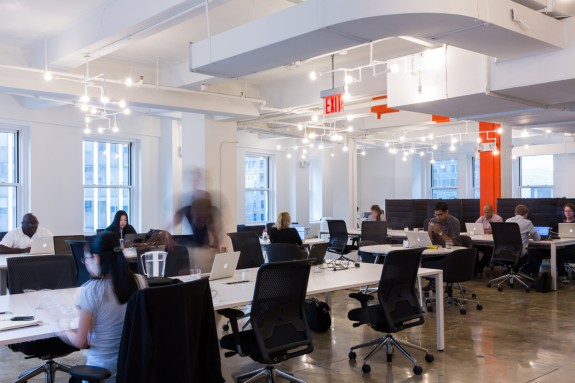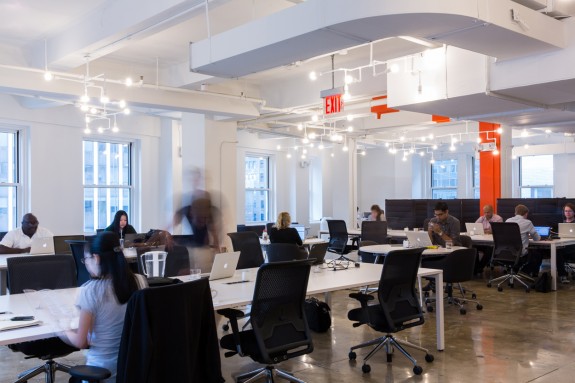workplace as city, city as workplace
 Sunday, December 1, 2013 at 12:15PM
Sunday, December 1, 2013 at 12:15PM A month ago I was on a panel at the day-long conference “Building the Digital City.” The scope was broad, but it was mostly about the emergence of NYC’s tech industry and the new information worker landscape. The timing was fortuitous. MESH had recently completed three spaces (Grind and IFP's Made in NY Media Center) featuring “co-working,” a term of art for an office shared by people who don’t work for the same company. Many who work in these offices are freelancers, although there are plenty of micro-companies and startups, too.
These spaces exemplify the new mode for information work (writing, marketing, law, consulting, design, etc). Without a dedicated desk, you bring your laptop to a space that feels right. That space might be at a large communal table, but it may also be in a comfortable armchair or a bustling cafe setting or standing at a high table or sequestered in a meeting room. It’s not far from the university model, the paradigm of the delicate balance of serious work and serious socializing, where you pick your spot according to your goal for the period of time.
This is the workplace as city — it resembles the familiar office form but offers a more varied landscape, opportunities for chance social encounters and different scenarios to foster creativity and energy. it is a kind of work village that Jane Jacobs might have appreciated. These spaces are often set up as tech incubators, which provide flexible accommodations for fledgling companies that might take off or fail at any moment. Conventional wisdom advised keeping startups out of New York, which was too cutthroat and expensive. But these new environments (along with the allure of staggering future valuations, naturally) are making New York an ever-more inviting place to hatch a tech company.
And that’s the converse: the city as workplace. Cities like New York offer an infinitely more social, physically connected environment for business. Silicon Valley’s science lab model of housing companies in isolated bunkers in office parks, inherited from Bell Labs et al., promotes sensory-deprivation focus, often beneficial. At the conference, executives from a few tech companies, most notably Google (who bought a giant building in Chelsea that ironically resembles those suburban bunkers) explained that they embraced the attractions of the city: street life, restaurants, transit. These are more than quality-of-life amenities — they are folded into the concept of the workplace. The example always cited is the Ace Hotel, where a highly social, mannered environment becomes a kind of workplace.
These changes have resulted of course from technological change both in the work that we are doing and how the work is being done. We need less specialized equipment. A basic laptop — really just a smartphone — can communicate, compute, write, design, control, edit, and research. So less talking on the phone (noisy, tethered), no need for clunky computers or file drawers. And a generation of information workers more interested in the excitement of a dynamic environment than the ownership of an office or cubicle.


